Research Proposal: Examining Negative Emotions & Decision Formulation
VerifiedAdded on 2023/04/25
|26
|6488
|299
AI Summary
This research proposal investigates the impact of negative emotions on judgment and decision-making processes. It aims to understand how negative emotions influence decision-making, exploring the shaping of decisions within social and business contexts and suggesting strategies for achieving rationality-led decisions. The proposal outlines research questions concerning the impact of negative emotions on decision-making, personal judgment, and the role of negative emotions in cognitive biases. The literature review emphasizes the importance of the decision-making process, the role of positive emotions, and the intricate relationship between emotions and decision-making, highlighting the various stages involved in effective decision-making. The methodology section details the research philosophy, design, data collection methods, sampling techniques, and data analysis approaches, while also addressing ethical considerations and limitations of the study. This proposal seeks to provide insights into the complex interplay between emotions and rational thought in decision-making, with the goal of informing strategies for more effective and unbiased decision-making processes. Desklib provides students with access to this and similar assignments, offering a platform for academic support and research resources.
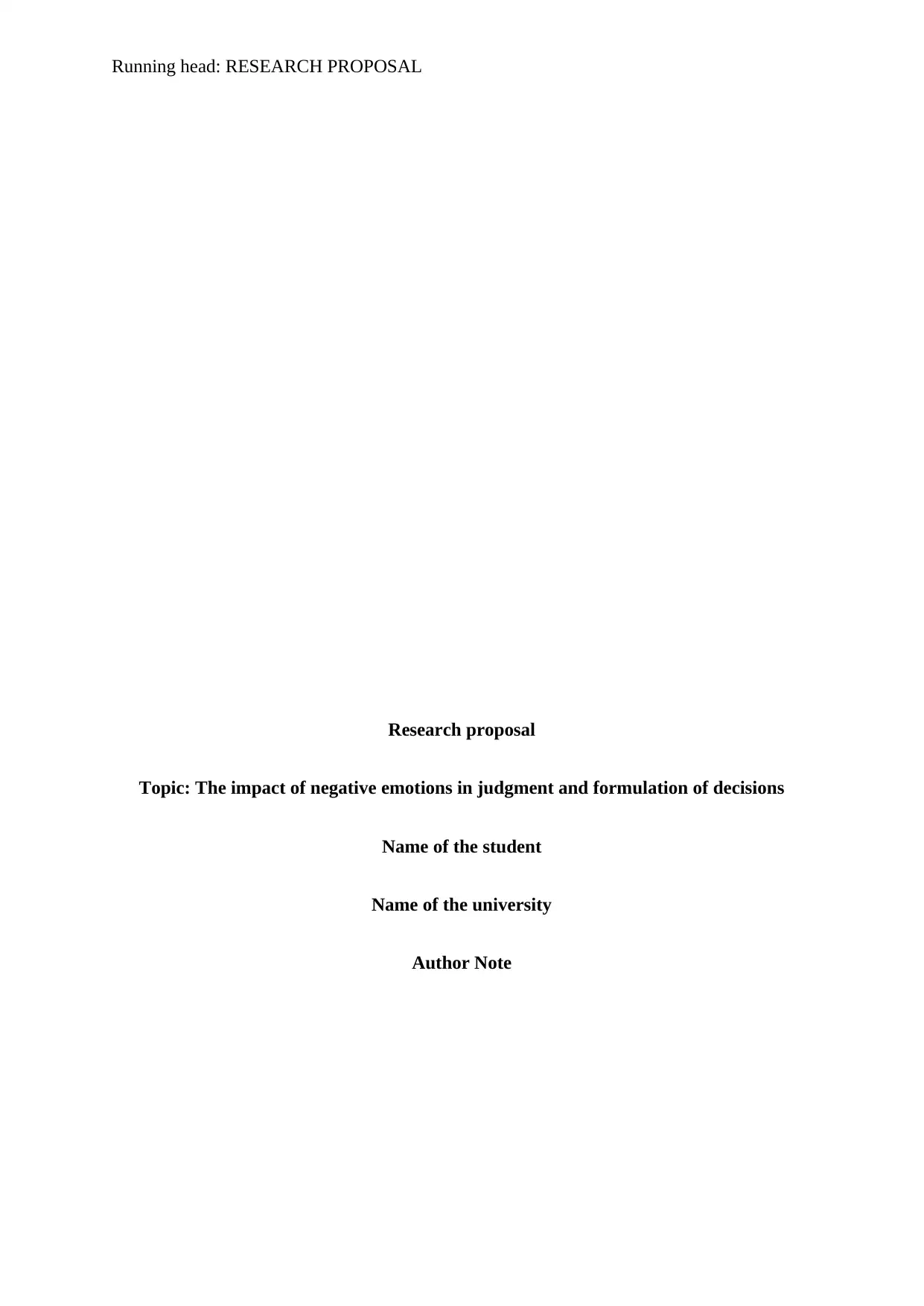
Running head: RESEARCH PROPOSAL
Research proposal
Topic: The impact of negative emotions in judgment and formulation of decisions
Name of the student
Name of the university
Author Note
Research proposal
Topic: The impact of negative emotions in judgment and formulation of decisions
Name of the student
Name of the university
Author Note
Paraphrase This Document
Need a fresh take? Get an instant paraphrase of this document with our AI Paraphraser
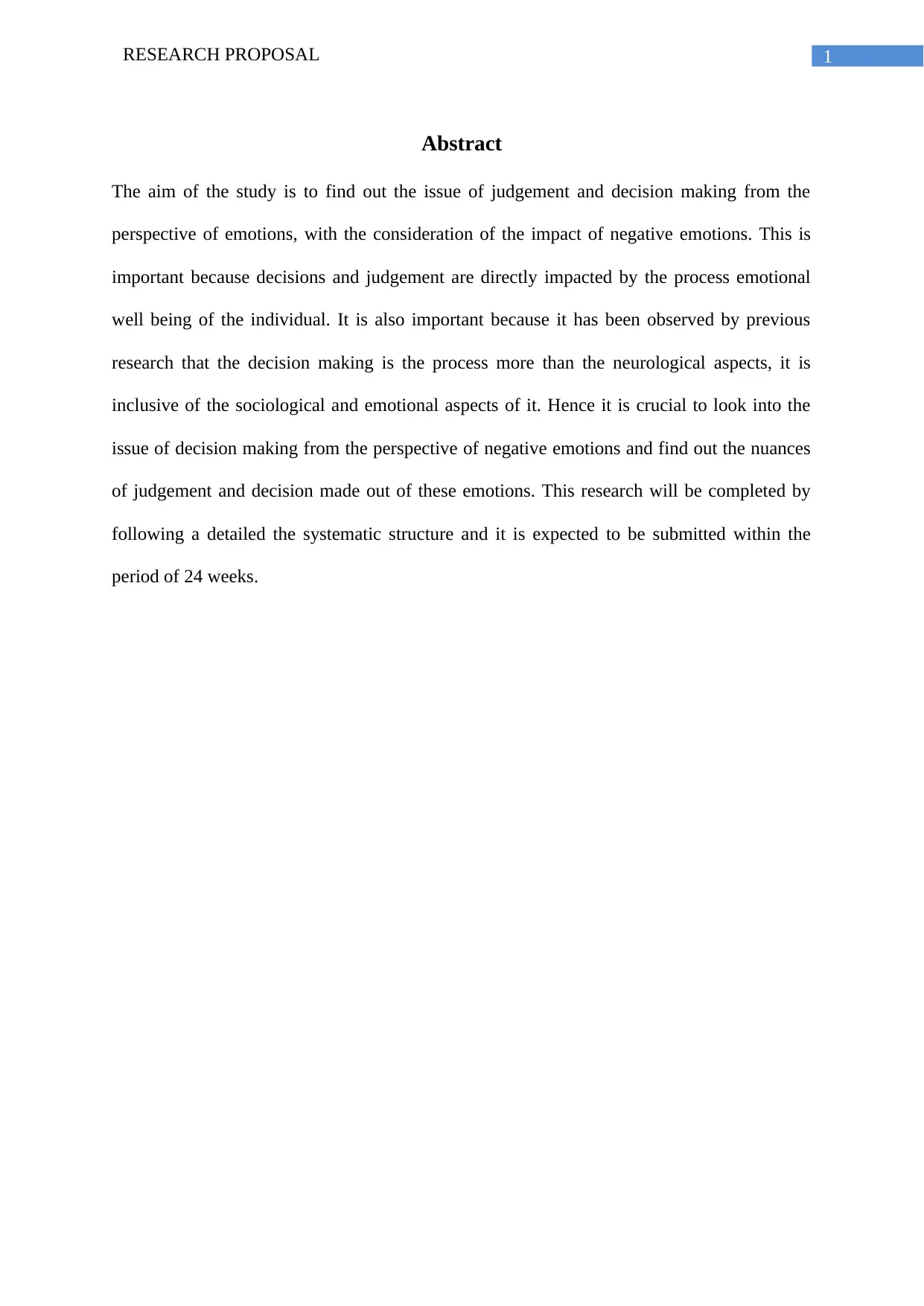
1RESEARCH PROPOSAL
Abstract
The aim of the study is to find out the issue of judgement and decision making from the
perspective of emotions, with the consideration of the impact of negative emotions. This is
important because decisions and judgement are directly impacted by the process emotional
well being of the individual. It is also important because it has been observed by previous
research that the decision making is the process more than the neurological aspects, it is
inclusive of the sociological and emotional aspects of it. Hence it is crucial to look into the
issue of decision making from the perspective of negative emotions and find out the nuances
of judgement and decision made out of these emotions. This research will be completed by
following a detailed the systematic structure and it is expected to be submitted within the
period of 24 weeks.
Abstract
The aim of the study is to find out the issue of judgement and decision making from the
perspective of emotions, with the consideration of the impact of negative emotions. This is
important because decisions and judgement are directly impacted by the process emotional
well being of the individual. It is also important because it has been observed by previous
research that the decision making is the process more than the neurological aspects, it is
inclusive of the sociological and emotional aspects of it. Hence it is crucial to look into the
issue of decision making from the perspective of negative emotions and find out the nuances
of judgement and decision made out of these emotions. This research will be completed by
following a detailed the systematic structure and it is expected to be submitted within the
period of 24 weeks.
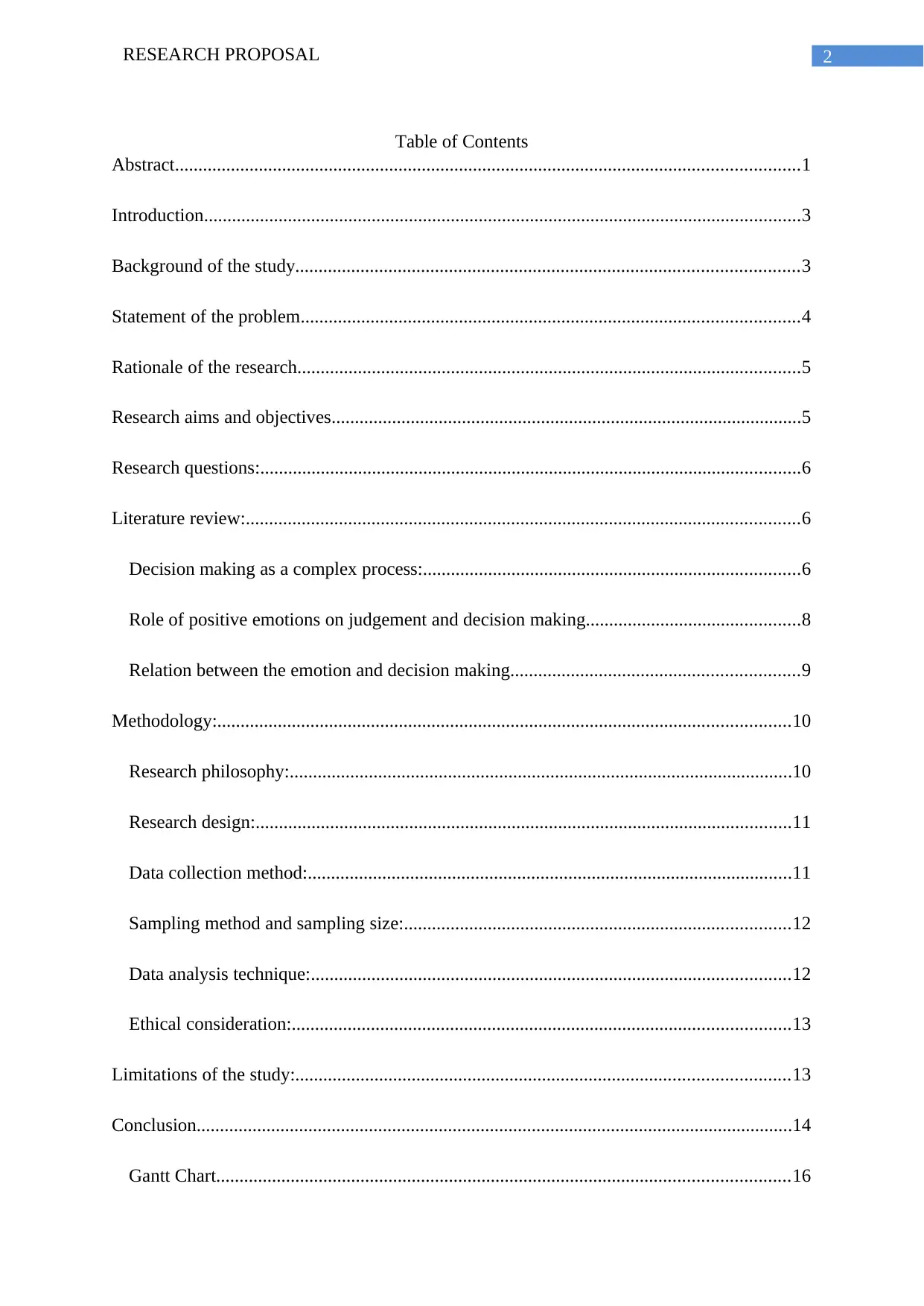
2RESEARCH PROPOSAL
Table of Contents
Abstract......................................................................................................................................1
Introduction................................................................................................................................3
Background of the study............................................................................................................3
Statement of the problem...........................................................................................................4
Rationale of the research............................................................................................................5
Research aims and objectives.....................................................................................................5
Research questions:....................................................................................................................6
Literature review:.......................................................................................................................6
Decision making as a complex process:.................................................................................6
Role of positive emotions on judgement and decision making..............................................8
Relation between the emotion and decision making..............................................................9
Methodology:...........................................................................................................................10
Research philosophy:............................................................................................................10
Research design:...................................................................................................................11
Data collection method:........................................................................................................11
Sampling method and sampling size:...................................................................................12
Data analysis technique:.......................................................................................................12
Ethical consideration:...........................................................................................................13
Limitations of the study:..........................................................................................................13
Conclusion................................................................................................................................14
Gantt Chart...........................................................................................................................16
Table of Contents
Abstract......................................................................................................................................1
Introduction................................................................................................................................3
Background of the study............................................................................................................3
Statement of the problem...........................................................................................................4
Rationale of the research............................................................................................................5
Research aims and objectives.....................................................................................................5
Research questions:....................................................................................................................6
Literature review:.......................................................................................................................6
Decision making as a complex process:.................................................................................6
Role of positive emotions on judgement and decision making..............................................8
Relation between the emotion and decision making..............................................................9
Methodology:...........................................................................................................................10
Research philosophy:............................................................................................................10
Research design:...................................................................................................................11
Data collection method:........................................................................................................11
Sampling method and sampling size:...................................................................................12
Data analysis technique:.......................................................................................................12
Ethical consideration:...........................................................................................................13
Limitations of the study:..........................................................................................................13
Conclusion................................................................................................................................14
Gantt Chart...........................................................................................................................16
⊘ This is a preview!⊘
Do you want full access?
Subscribe today to unlock all pages.

Trusted by 1+ million students worldwide

3RESEARCH PROPOSAL
Source: (Created by the author)............................................................................................16
References................................................................................................................................17
Source: (Created by the author)............................................................................................16
References................................................................................................................................17
Paraphrase This Document
Need a fresh take? Get an instant paraphrase of this document with our AI Paraphraser
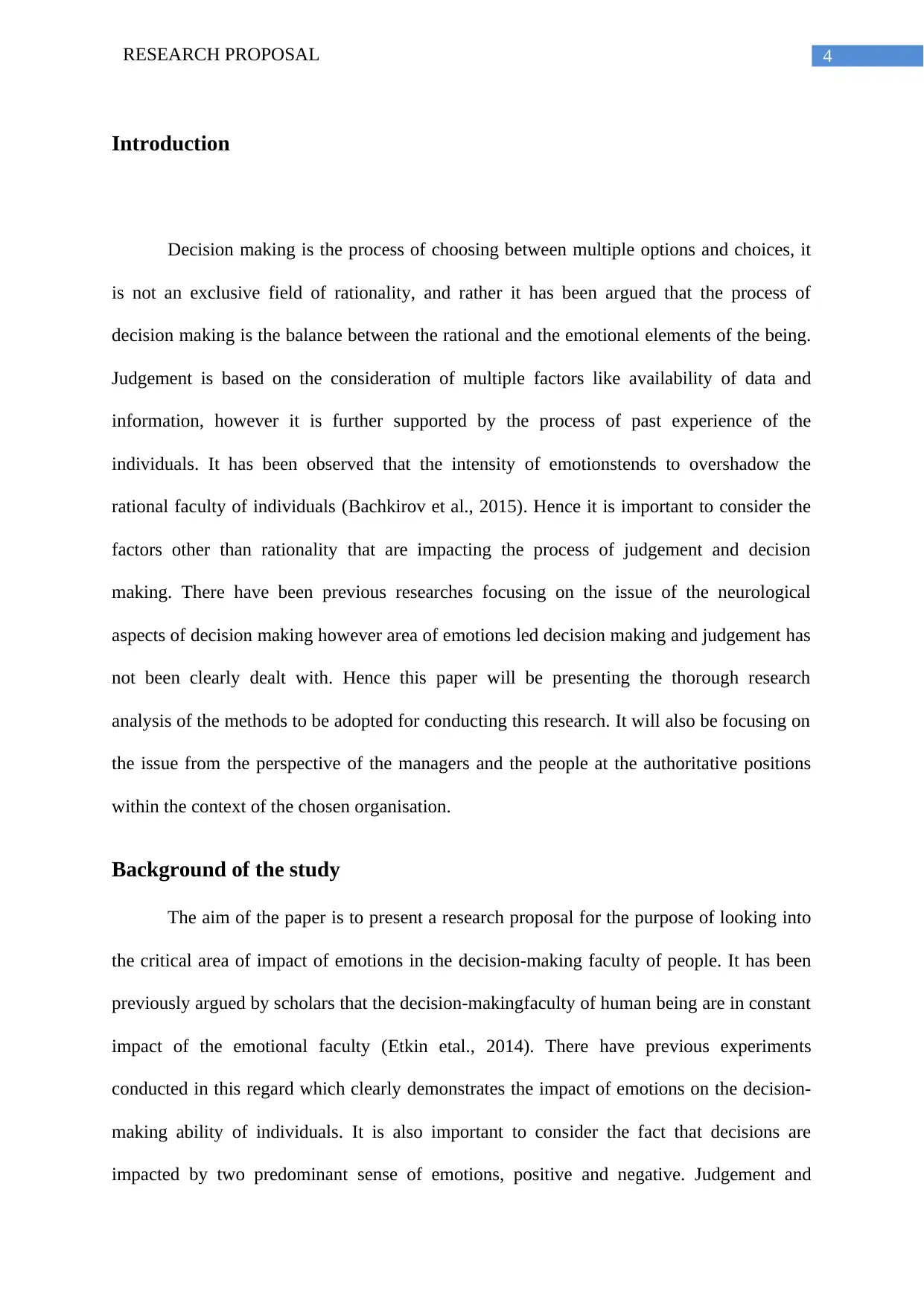
4RESEARCH PROPOSAL
Introduction
Decision making is the process of choosing between multiple options and choices, it
is not an exclusive field of rationality, and rather it has been argued that the process of
decision making is the balance between the rational and the emotional elements of the being.
Judgement is based on the consideration of multiple factors like availability of data and
information, however it is further supported by the process of past experience of the
individuals. It has been observed that the intensity of emotionstends to overshadow the
rational faculty of individuals (Bachkirov et al., 2015). Hence it is important to consider the
factors other than rationality that are impacting the process of judgement and decision
making. There have been previous researches focusing on the issue of the neurological
aspects of decision making however area of emotions led decision making and judgement has
not been clearly dealt with. Hence this paper will be presenting the thorough research
analysis of the methods to be adopted for conducting this research. It will also be focusing on
the issue from the perspective of the managers and the people at the authoritative positions
within the context of the chosen organisation.
Background of the study
The aim of the paper is to present a research proposal for the purpose of looking into
the critical area of impact of emotions in the decision-making faculty of people. It has been
previously argued by scholars that the decision-makingfaculty of human being are in constant
impact of the emotional faculty (Etkin etal., 2014). There have previous experiments
conducted in this regard which clearly demonstrates the impact of emotions on the decision-
making ability of individuals. It is also important to consider the fact that decisions are
impacted by two predominant sense of emotions, positive and negative. Judgement and
Introduction
Decision making is the process of choosing between multiple options and choices, it
is not an exclusive field of rationality, and rather it has been argued that the process of
decision making is the balance between the rational and the emotional elements of the being.
Judgement is based on the consideration of multiple factors like availability of data and
information, however it is further supported by the process of past experience of the
individuals. It has been observed that the intensity of emotionstends to overshadow the
rational faculty of individuals (Bachkirov et al., 2015). Hence it is important to consider the
factors other than rationality that are impacting the process of judgement and decision
making. There have been previous researches focusing on the issue of the neurological
aspects of decision making however area of emotions led decision making and judgement has
not been clearly dealt with. Hence this paper will be presenting the thorough research
analysis of the methods to be adopted for conducting this research. It will also be focusing on
the issue from the perspective of the managers and the people at the authoritative positions
within the context of the chosen organisation.
Background of the study
The aim of the paper is to present a research proposal for the purpose of looking into
the critical area of impact of emotions in the decision-making faculty of people. It has been
previously argued by scholars that the decision-makingfaculty of human being are in constant
impact of the emotional faculty (Etkin etal., 2014). There have previous experiments
conducted in this regard which clearly demonstrates the impact of emotions on the decision-
making ability of individuals. It is also important to consider the fact that decisions are
impacted by two predominant sense of emotions, positive and negative. Judgement and
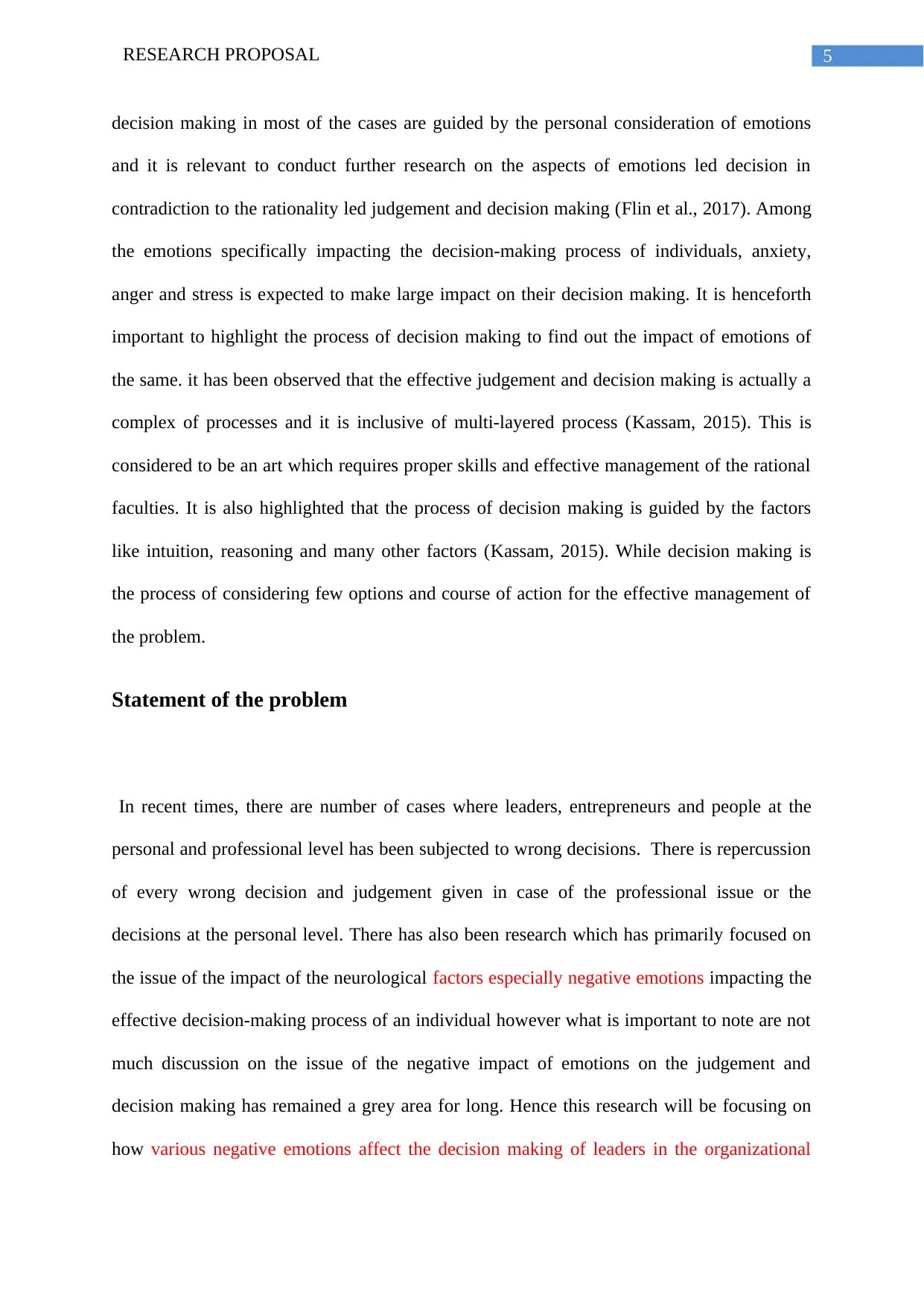
5RESEARCH PROPOSAL
decision making in most of the cases are guided by the personal consideration of emotions
and it is relevant to conduct further research on the aspects of emotions led decision in
contradiction to the rationality led judgement and decision making (Flin et al., 2017). Among
the emotions specifically impacting the decision-making process of individuals, anxiety,
anger and stress is expected to make large impact on their decision making. It is henceforth
important to highlight the process of decision making to find out the impact of emotions of
the same. it has been observed that the effective judgement and decision making is actually a
complex of processes and it is inclusive of multi-layered process (Kassam, 2015). This is
considered to be an art which requires proper skills and effective management of the rational
faculties. It is also highlighted that the process of decision making is guided by the factors
like intuition, reasoning and many other factors (Kassam, 2015). While decision making is
the process of considering few options and course of action for the effective management of
the problem.
Statement of the problem
In recent times, there are number of cases where leaders, entrepreneurs and people at the
personal and professional level has been subjected to wrong decisions. There is repercussion
of every wrong decision and judgement given in case of the professional issue or the
decisions at the personal level. There has also been research which has primarily focused on
the issue of the impact of the neurological factors especially negative emotions impacting the
effective decision-making process of an individual however what is important to note are not
much discussion on the issue of the negative impact of emotions on the judgement and
decision making has remained a grey area for long. Hence this research will be focusing on
how various negative emotions affect the decision making of leaders in the organizational
decision making in most of the cases are guided by the personal consideration of emotions
and it is relevant to conduct further research on the aspects of emotions led decision in
contradiction to the rationality led judgement and decision making (Flin et al., 2017). Among
the emotions specifically impacting the decision-making process of individuals, anxiety,
anger and stress is expected to make large impact on their decision making. It is henceforth
important to highlight the process of decision making to find out the impact of emotions of
the same. it has been observed that the effective judgement and decision making is actually a
complex of processes and it is inclusive of multi-layered process (Kassam, 2015). This is
considered to be an art which requires proper skills and effective management of the rational
faculties. It is also highlighted that the process of decision making is guided by the factors
like intuition, reasoning and many other factors (Kassam, 2015). While decision making is
the process of considering few options and course of action for the effective management of
the problem.
Statement of the problem
In recent times, there are number of cases where leaders, entrepreneurs and people at the
personal and professional level has been subjected to wrong decisions. There is repercussion
of every wrong decision and judgement given in case of the professional issue or the
decisions at the personal level. There has also been research which has primarily focused on
the issue of the impact of the neurological factors especially negative emotions impacting the
effective decision-making process of an individual however what is important to note are not
much discussion on the issue of the negative impact of emotions on the judgement and
decision making has remained a grey area for long. Hence this research will be focusing on
how various negative emotions affect the decision making of leaders in the organizational
⊘ This is a preview!⊘
Do you want full access?
Subscribe today to unlock all pages.

Trusted by 1+ million students worldwide
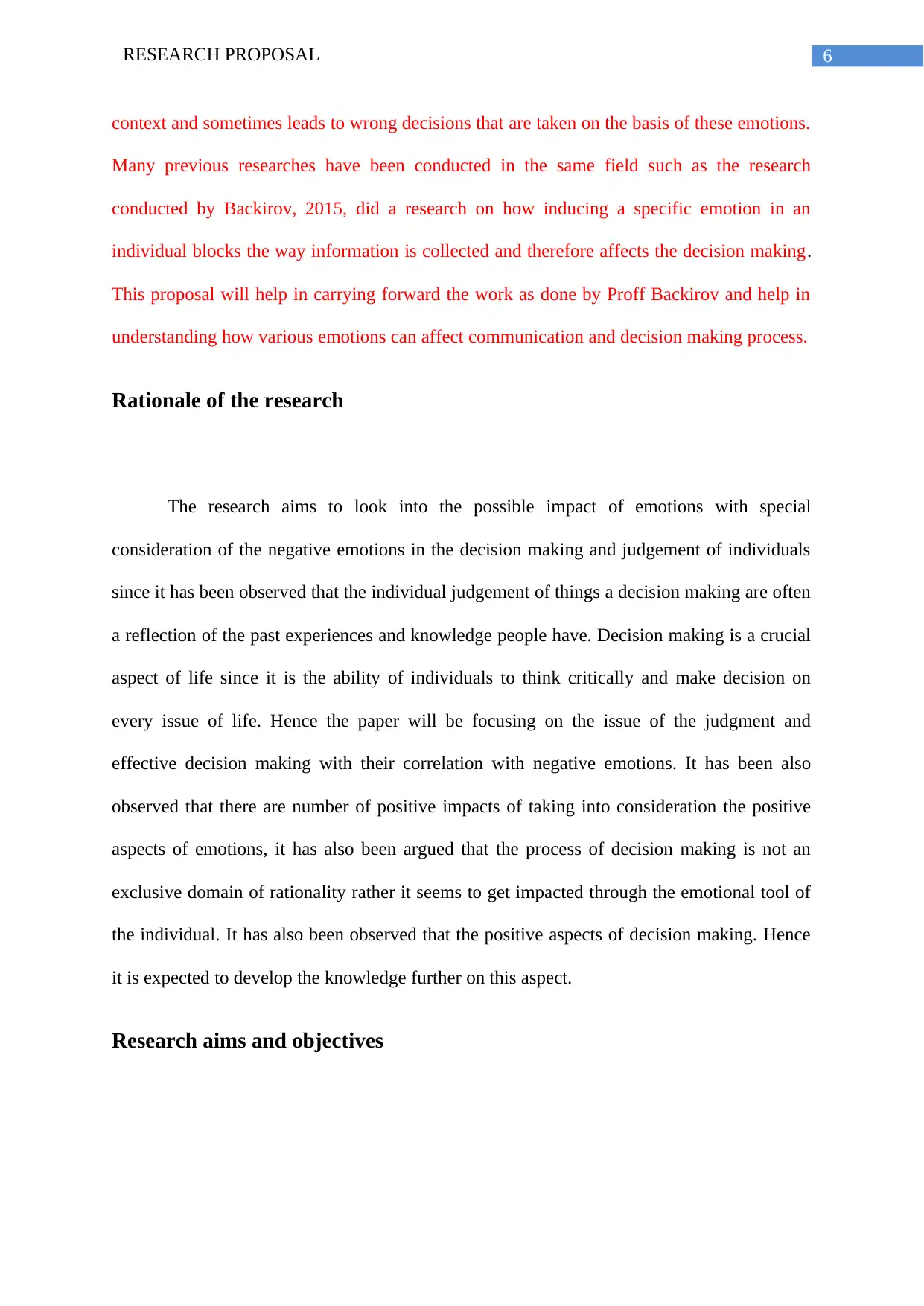
6RESEARCH PROPOSAL
context and sometimes leads to wrong decisions that are taken on the basis of these emotions.
Many previous researches have been conducted in the same field such as the research
conducted by Backirov, 2015, did a research on how inducing a specific emotion in an
individual blocks the way information is collected and therefore affects the decision making.
This proposal will help in carrying forward the work as done by Proff Backirov and help in
understanding how various emotions can affect communication and decision making process.
Rationale of the research
The research aims to look into the possible impact of emotions with special
consideration of the negative emotions in the decision making and judgement of individuals
since it has been observed that the individual judgement of things a decision making are often
a reflection of the past experiences and knowledge people have. Decision making is a crucial
aspect of life since it is the ability of individuals to think critically and make decision on
every issue of life. Hence the paper will be focusing on the issue of the judgment and
effective decision making with their correlation with negative emotions. It has been also
observed that there are number of positive impacts of taking into consideration the positive
aspects of emotions, it has also been argued that the process of decision making is not an
exclusive domain of rationality rather it seems to get impacted through the emotional tool of
the individual. It has also been observed that the positive aspects of decision making. Hence
it is expected to develop the knowledge further on this aspect.
Research aims and objectives
context and sometimes leads to wrong decisions that are taken on the basis of these emotions.
Many previous researches have been conducted in the same field such as the research
conducted by Backirov, 2015, did a research on how inducing a specific emotion in an
individual blocks the way information is collected and therefore affects the decision making.
This proposal will help in carrying forward the work as done by Proff Backirov and help in
understanding how various emotions can affect communication and decision making process.
Rationale of the research
The research aims to look into the possible impact of emotions with special
consideration of the negative emotions in the decision making and judgement of individuals
since it has been observed that the individual judgement of things a decision making are often
a reflection of the past experiences and knowledge people have. Decision making is a crucial
aspect of life since it is the ability of individuals to think critically and make decision on
every issue of life. Hence the paper will be focusing on the issue of the judgment and
effective decision making with their correlation with negative emotions. It has been also
observed that there are number of positive impacts of taking into consideration the positive
aspects of emotions, it has also been argued that the process of decision making is not an
exclusive domain of rationality rather it seems to get impacted through the emotional tool of
the individual. It has also been observed that the positive aspects of decision making. Hence
it is expected to develop the knowledge further on this aspect.
Research aims and objectives
Paraphrase This Document
Need a fresh take? Get an instant paraphrase of this document with our AI Paraphraser
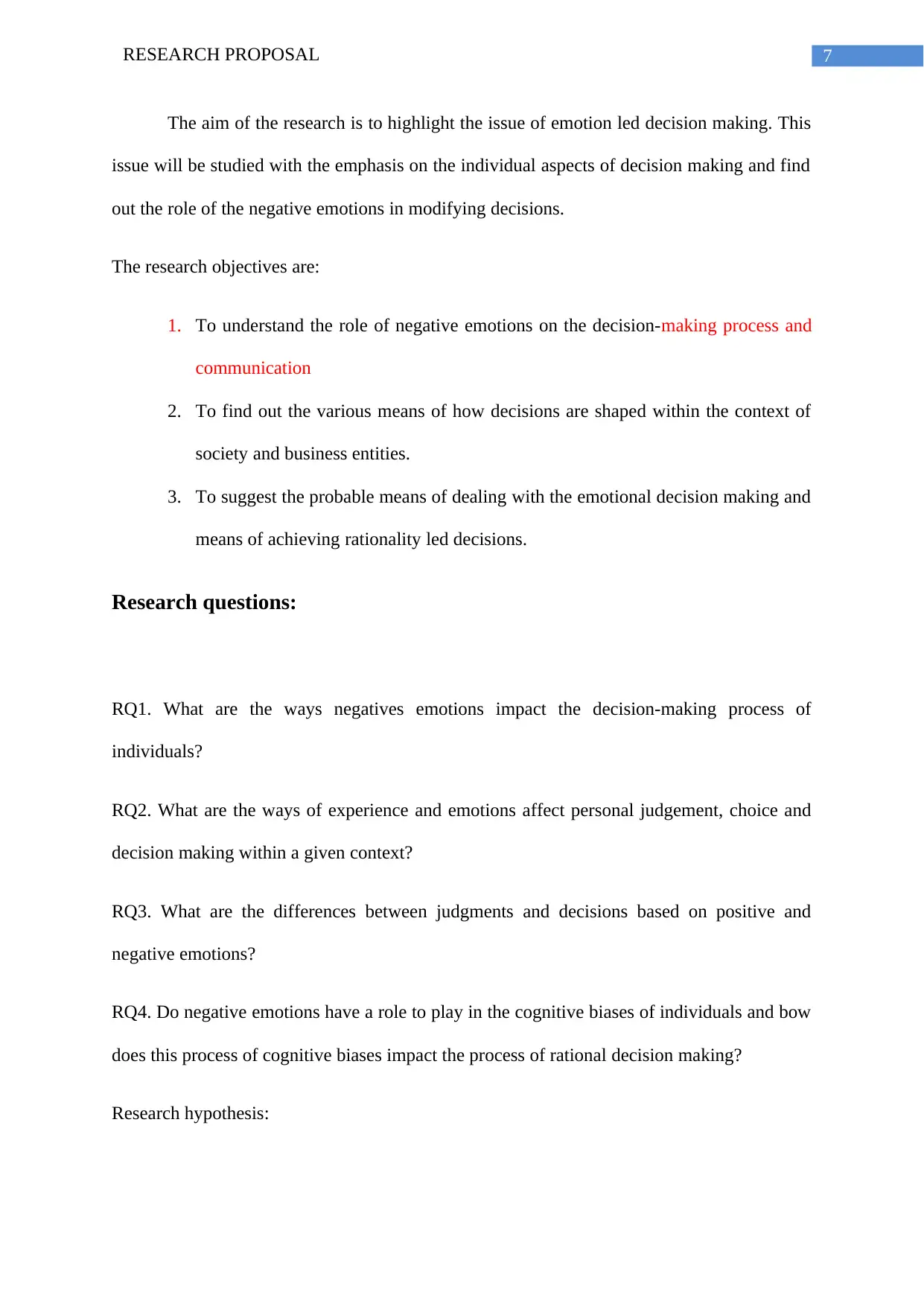
7RESEARCH PROPOSAL
The aim of the research is to highlight the issue of emotion led decision making. This
issue will be studied with the emphasis on the individual aspects of decision making and find
out the role of the negative emotions in modifying decisions.
The research objectives are:
1. To understand the role of negative emotions on the decision-making process and
communication
2. To find out the various means of how decisions are shaped within the context of
society and business entities.
3. To suggest the probable means of dealing with the emotional decision making and
means of achieving rationality led decisions.
Research questions:
RQ1. What are the ways negatives emotions impact the decision-making process of
individuals?
RQ2. What are the ways of experience and emotions affect personal judgement, choice and
decision making within a given context?
RQ3. What are the differences between judgments and decisions based on positive and
negative emotions?
RQ4. Do negative emotions have a role to play in the cognitive biases of individuals and bow
does this process of cognitive biases impact the process of rational decision making?
Research hypothesis:
The aim of the research is to highlight the issue of emotion led decision making. This
issue will be studied with the emphasis on the individual aspects of decision making and find
out the role of the negative emotions in modifying decisions.
The research objectives are:
1. To understand the role of negative emotions on the decision-making process and
communication
2. To find out the various means of how decisions are shaped within the context of
society and business entities.
3. To suggest the probable means of dealing with the emotional decision making and
means of achieving rationality led decisions.
Research questions:
RQ1. What are the ways negatives emotions impact the decision-making process of
individuals?
RQ2. What are the ways of experience and emotions affect personal judgement, choice and
decision making within a given context?
RQ3. What are the differences between judgments and decisions based on positive and
negative emotions?
RQ4. Do negative emotions have a role to play in the cognitive biases of individuals and bow
does this process of cognitive biases impact the process of rational decision making?
Research hypothesis:
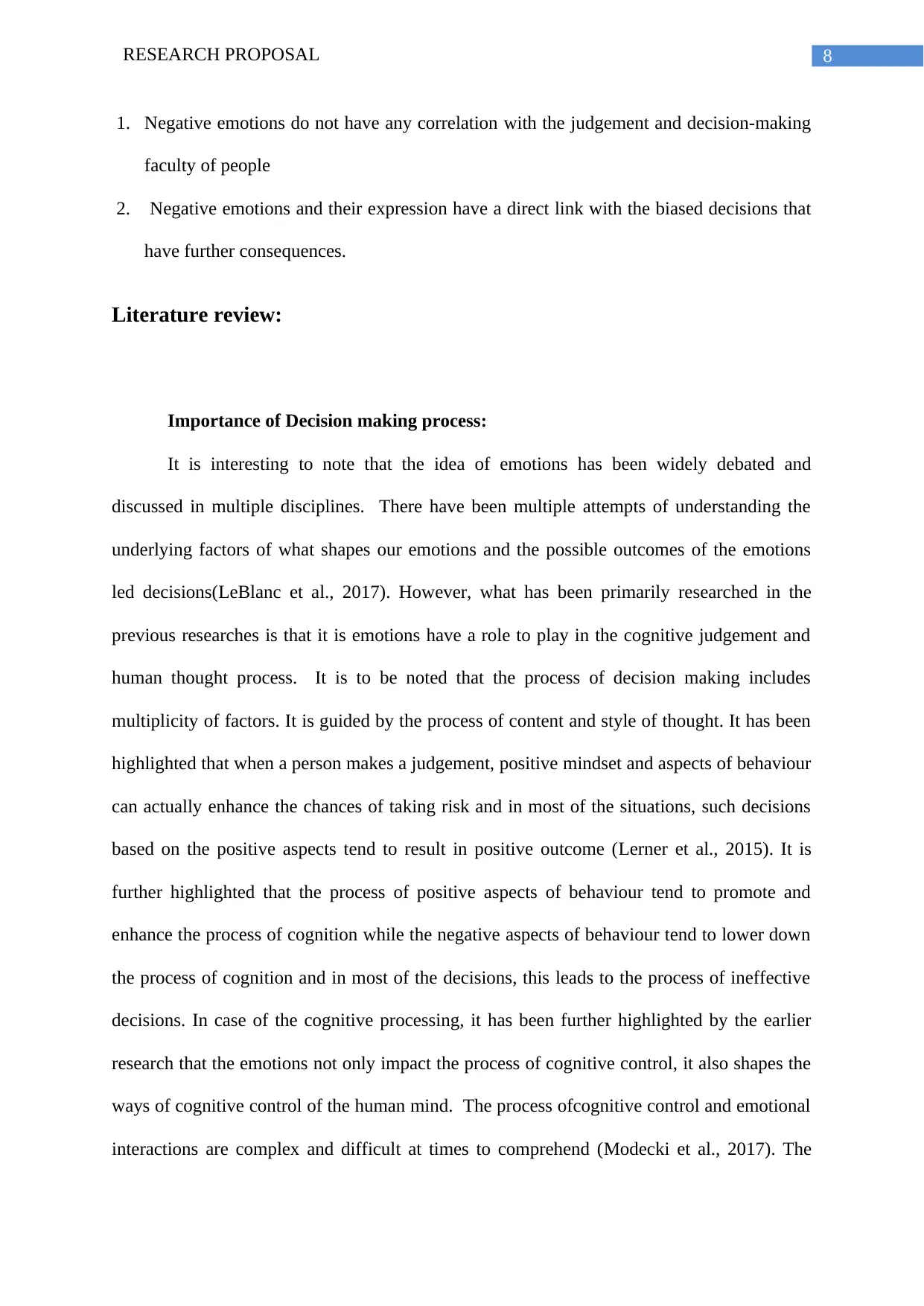
8RESEARCH PROPOSAL
1. Negative emotions do not have any correlation with the judgement and decision-making
faculty of people
2. Negative emotions and their expression have a direct link with the biased decisions that
have further consequences.
Literature review:
Importance of Decision making process:
It is interesting to note that the idea of emotions has been widely debated and
discussed in multiple disciplines. There have been multiple attempts of understanding the
underlying factors of what shapes our emotions and the possible outcomes of the emotions
led decisions(LeBlanc et al., 2017). However, what has been primarily researched in the
previous researches is that it is emotions have a role to play in the cognitive judgement and
human thought process. It is to be noted that the process of decision making includes
multiplicity of factors. It is guided by the process of content and style of thought. It has been
highlighted that when a person makes a judgement, positive mindset and aspects of behaviour
can actually enhance the chances of taking risk and in most of the situations, such decisions
based on the positive aspects tend to result in positive outcome (Lerner et al., 2015). It is
further highlighted that the process of positive aspects of behaviour tend to promote and
enhance the process of cognition while the negative aspects of behaviour tend to lower down
the process of cognition and in most of the decisions, this leads to the process of ineffective
decisions. In case of the cognitive processing, it has been further highlighted by the earlier
research that the emotions not only impact the process of cognitive control, it also shapes the
ways of cognitive control of the human mind. The process ofcognitive control and emotional
interactions are complex and difficult at times to comprehend (Modecki et al., 2017). The
1. Negative emotions do not have any correlation with the judgement and decision-making
faculty of people
2. Negative emotions and their expression have a direct link with the biased decisions that
have further consequences.
Literature review:
Importance of Decision making process:
It is interesting to note that the idea of emotions has been widely debated and
discussed in multiple disciplines. There have been multiple attempts of understanding the
underlying factors of what shapes our emotions and the possible outcomes of the emotions
led decisions(LeBlanc et al., 2017). However, what has been primarily researched in the
previous researches is that it is emotions have a role to play in the cognitive judgement and
human thought process. It is to be noted that the process of decision making includes
multiplicity of factors. It is guided by the process of content and style of thought. It has been
highlighted that when a person makes a judgement, positive mindset and aspects of behaviour
can actually enhance the chances of taking risk and in most of the situations, such decisions
based on the positive aspects tend to result in positive outcome (Lerner et al., 2015). It is
further highlighted that the process of positive aspects of behaviour tend to promote and
enhance the process of cognition while the negative aspects of behaviour tend to lower down
the process of cognition and in most of the decisions, this leads to the process of ineffective
decisions. In case of the cognitive processing, it has been further highlighted by the earlier
research that the emotions not only impact the process of cognitive control, it also shapes the
ways of cognitive control of the human mind. The process ofcognitive control and emotional
interactions are complex and difficult at times to comprehend (Modecki et al., 2017). The
⊘ This is a preview!⊘
Do you want full access?
Subscribe today to unlock all pages.

Trusted by 1+ million students worldwide
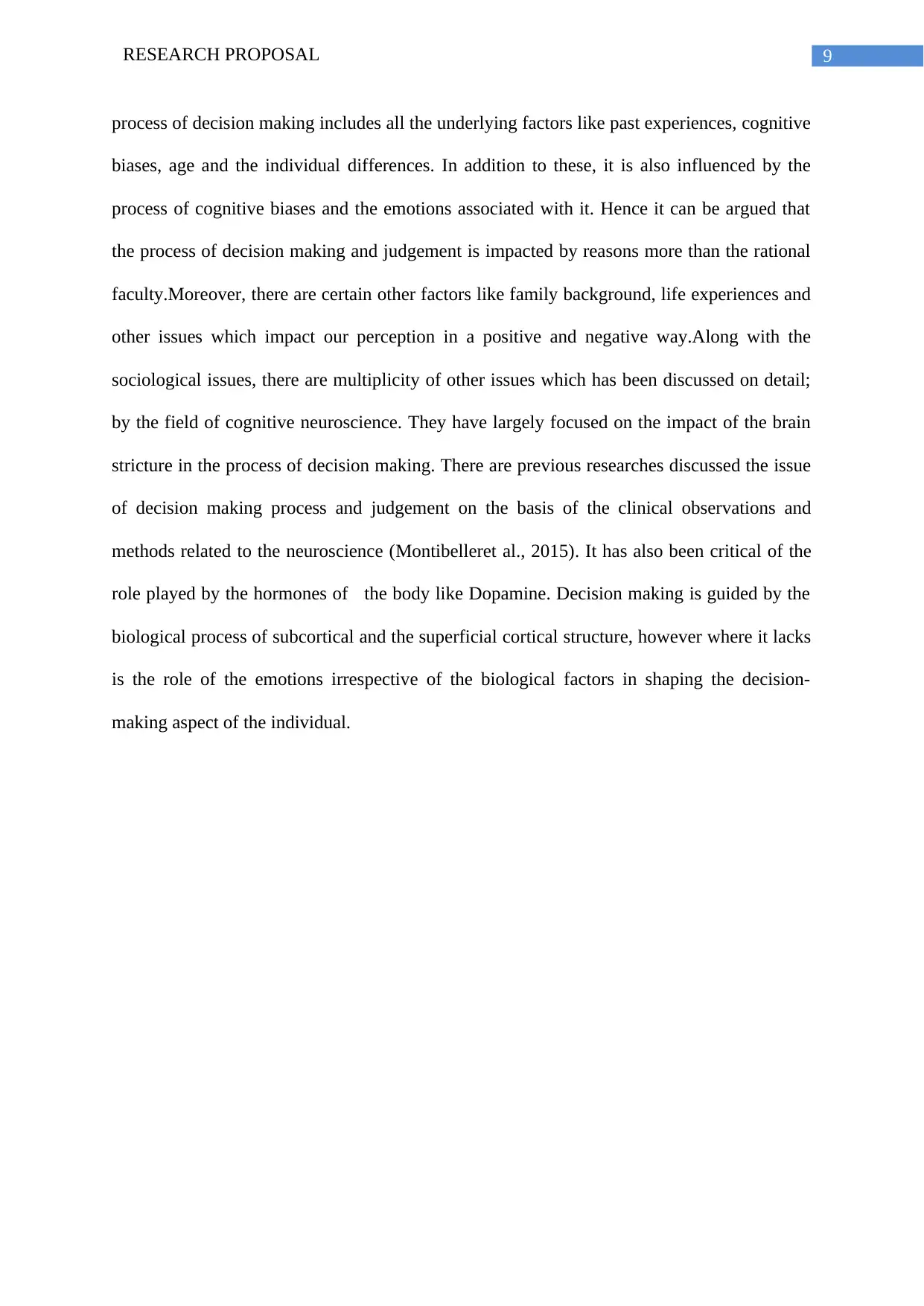
9RESEARCH PROPOSAL
process of decision making includes all the underlying factors like past experiences, cognitive
biases, age and the individual differences. In addition to these, it is also influenced by the
process of cognitive biases and the emotions associated with it. Hence it can be argued that
the process of decision making and judgement is impacted by reasons more than the rational
faculty.Moreover, there are certain other factors like family background, life experiences and
other issues which impact our perception in a positive and negative way.Along with the
sociological issues, there are multiplicity of other issues which has been discussed on detail;
by the field of cognitive neuroscience. They have largely focused on the impact of the brain
stricture in the process of decision making. There are previous researches discussed the issue
of decision making process and judgement on the basis of the clinical observations and
methods related to the neuroscience (Montibelleret al., 2015). It has also been critical of the
role played by the hormones of the body like Dopamine. Decision making is guided by the
biological process of subcortical and the superficial cortical structure, however where it lacks
is the role of the emotions irrespective of the biological factors in shaping the decision-
making aspect of the individual.
process of decision making includes all the underlying factors like past experiences, cognitive
biases, age and the individual differences. In addition to these, it is also influenced by the
process of cognitive biases and the emotions associated with it. Hence it can be argued that
the process of decision making and judgement is impacted by reasons more than the rational
faculty.Moreover, there are certain other factors like family background, life experiences and
other issues which impact our perception in a positive and negative way.Along with the
sociological issues, there are multiplicity of other issues which has been discussed on detail;
by the field of cognitive neuroscience. They have largely focused on the impact of the brain
stricture in the process of decision making. There are previous researches discussed the issue
of decision making process and judgement on the basis of the clinical observations and
methods related to the neuroscience (Montibelleret al., 2015). It has also been critical of the
role played by the hormones of the body like Dopamine. Decision making is guided by the
biological process of subcortical and the superficial cortical structure, however where it lacks
is the role of the emotions irrespective of the biological factors in shaping the decision-
making aspect of the individual.
Paraphrase This Document
Need a fresh take? Get an instant paraphrase of this document with our AI Paraphraser
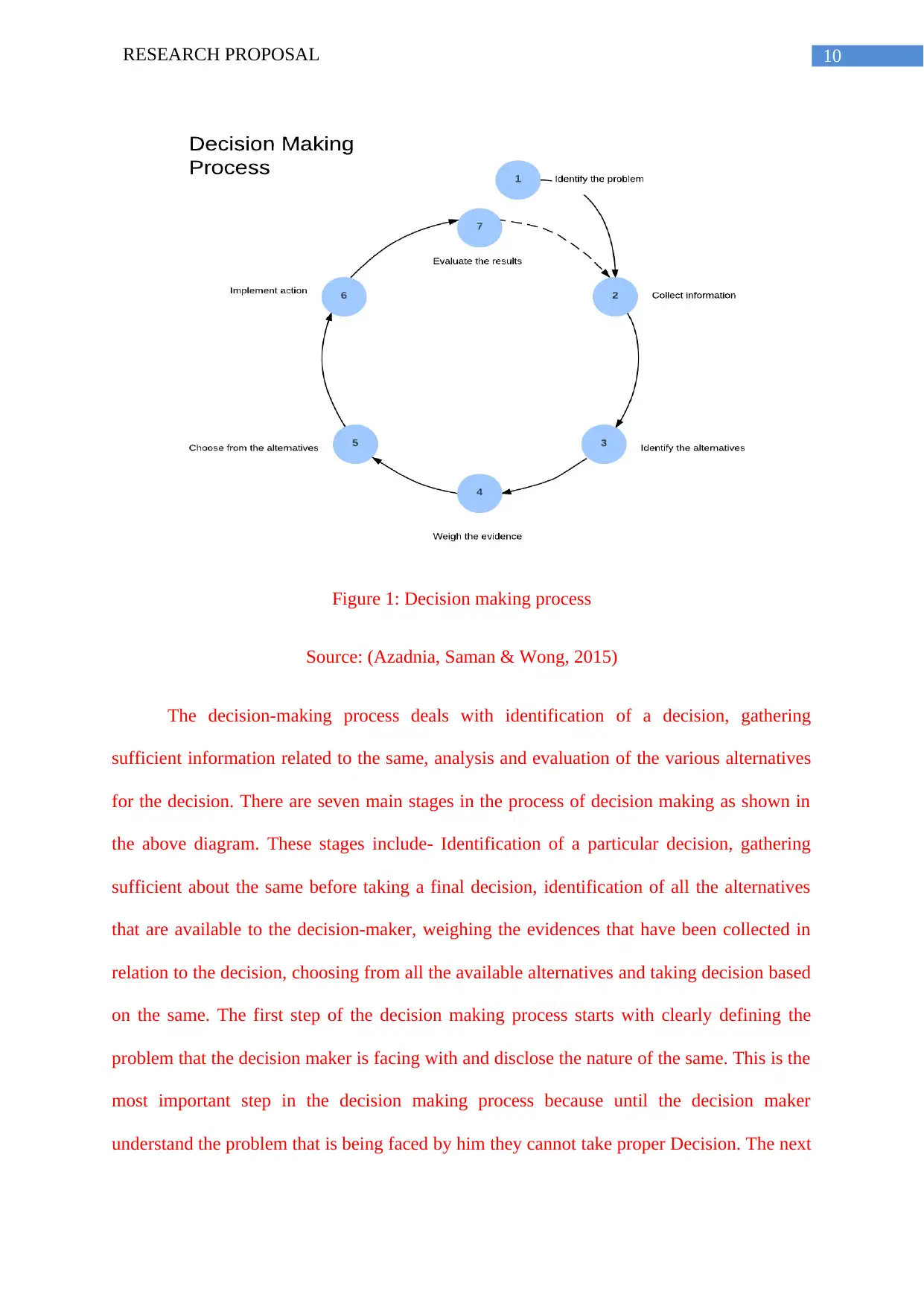
10RESEARCH PROPOSAL
Figure 1: Decision making process
Source: (Azadnia, Saman & Wong, 2015)
The decision-making process deals with identification of a decision, gathering
sufficient information related to the same, analysis and evaluation of the various alternatives
for the decision. There are seven main stages in the process of decision making as shown in
the above diagram. These stages include- Identification of a particular decision, gathering
sufficient about the same before taking a final decision, identification of all the alternatives
that are available to the decision-maker, weighing the evidences that have been collected in
relation to the decision, choosing from all the available alternatives and taking decision based
on the same. The first step of the decision making process starts with clearly defining the
problem that the decision maker is facing with and disclose the nature of the same. This is the
most important step in the decision making process because until the decision maker
understand the problem that is being faced by him they cannot take proper Decision. The next
Figure 1: Decision making process
Source: (Azadnia, Saman & Wong, 2015)
The decision-making process deals with identification of a decision, gathering
sufficient information related to the same, analysis and evaluation of the various alternatives
for the decision. There are seven main stages in the process of decision making as shown in
the above diagram. These stages include- Identification of a particular decision, gathering
sufficient about the same before taking a final decision, identification of all the alternatives
that are available to the decision-maker, weighing the evidences that have been collected in
relation to the decision, choosing from all the available alternatives and taking decision based
on the same. The first step of the decision making process starts with clearly defining the
problem that the decision maker is facing with and disclose the nature of the same. This is the
most important step in the decision making process because until the decision maker
understand the problem that is being faced by him they cannot take proper Decision. The next
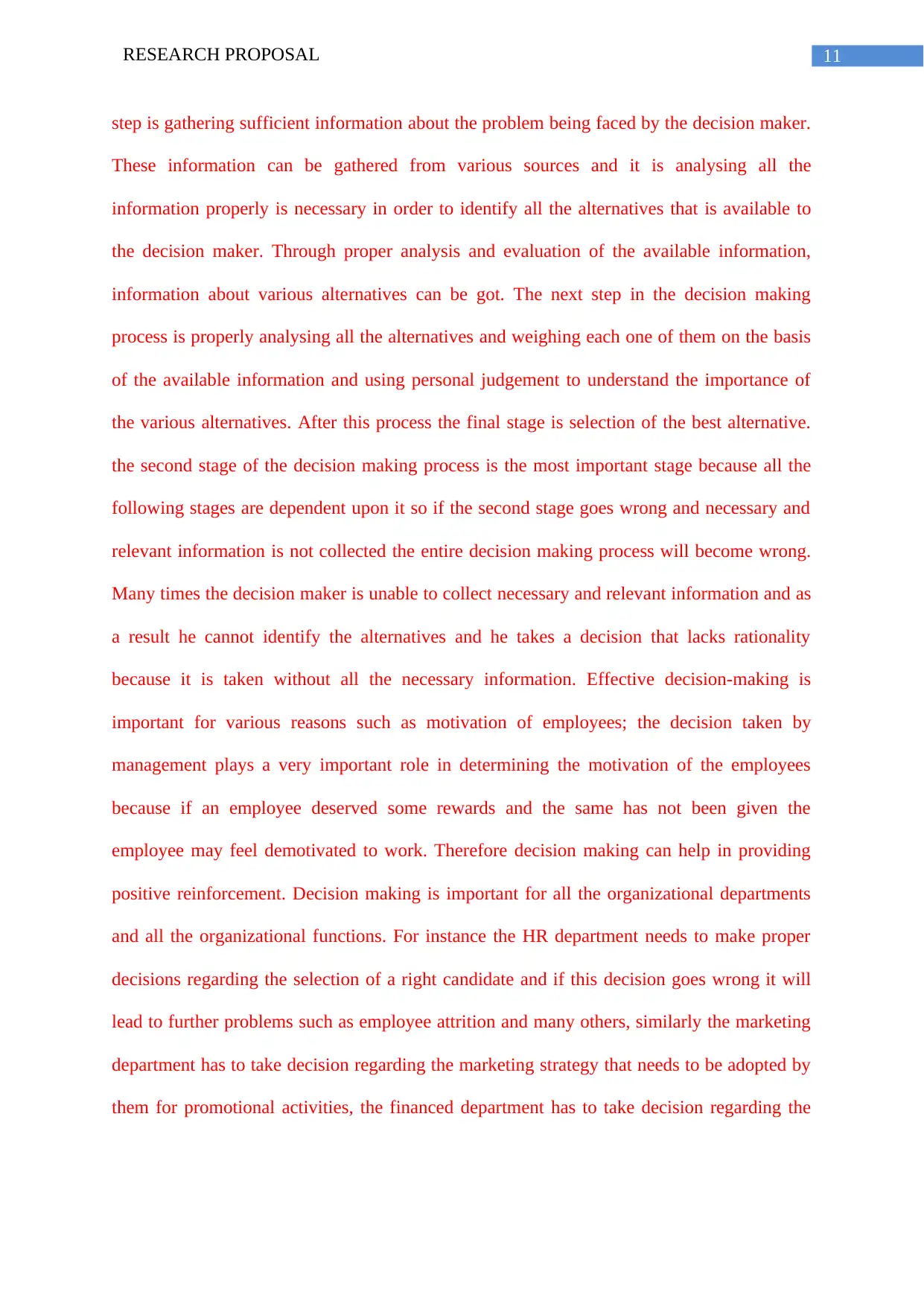
11RESEARCH PROPOSAL
step is gathering sufficient information about the problem being faced by the decision maker.
These information can be gathered from various sources and it is analysing all the
information properly is necessary in order to identify all the alternatives that is available to
the decision maker. Through proper analysis and evaluation of the available information,
information about various alternatives can be got. The next step in the decision making
process is properly analysing all the alternatives and weighing each one of them on the basis
of the available information and using personal judgement to understand the importance of
the various alternatives. After this process the final stage is selection of the best alternative.
the second stage of the decision making process is the most important stage because all the
following stages are dependent upon it so if the second stage goes wrong and necessary and
relevant information is not collected the entire decision making process will become wrong.
Many times the decision maker is unable to collect necessary and relevant information and as
a result he cannot identify the alternatives and he takes a decision that lacks rationality
because it is taken without all the necessary information. Effective decision-making is
important for various reasons such as motivation of employees; the decision taken by
management plays a very important role in determining the motivation of the employees
because if an employee deserved some rewards and the same has not been given the
employee may feel demotivated to work. Therefore decision making can help in providing
positive reinforcement. Decision making is important for all the organizational departments
and all the organizational functions. For instance the HR department needs to make proper
decisions regarding the selection of a right candidate and if this decision goes wrong it will
lead to further problems such as employee attrition and many others, similarly the marketing
department has to take decision regarding the marketing strategy that needs to be adopted by
them for promotional activities, the financed department has to take decision regarding the
step is gathering sufficient information about the problem being faced by the decision maker.
These information can be gathered from various sources and it is analysing all the
information properly is necessary in order to identify all the alternatives that is available to
the decision maker. Through proper analysis and evaluation of the available information,
information about various alternatives can be got. The next step in the decision making
process is properly analysing all the alternatives and weighing each one of them on the basis
of the available information and using personal judgement to understand the importance of
the various alternatives. After this process the final stage is selection of the best alternative.
the second stage of the decision making process is the most important stage because all the
following stages are dependent upon it so if the second stage goes wrong and necessary and
relevant information is not collected the entire decision making process will become wrong.
Many times the decision maker is unable to collect necessary and relevant information and as
a result he cannot identify the alternatives and he takes a decision that lacks rationality
because it is taken without all the necessary information. Effective decision-making is
important for various reasons such as motivation of employees; the decision taken by
management plays a very important role in determining the motivation of the employees
because if an employee deserved some rewards and the same has not been given the
employee may feel demotivated to work. Therefore decision making can help in providing
positive reinforcement. Decision making is important for all the organizational departments
and all the organizational functions. For instance the HR department needs to make proper
decisions regarding the selection of a right candidate and if this decision goes wrong it will
lead to further problems such as employee attrition and many others, similarly the marketing
department has to take decision regarding the marketing strategy that needs to be adopted by
them for promotional activities, the financed department has to take decision regarding the
⊘ This is a preview!⊘
Do you want full access?
Subscribe today to unlock all pages.

Trusted by 1+ million students worldwide
1 out of 26
Related Documents
Your All-in-One AI-Powered Toolkit for Academic Success.
+13062052269
info@desklib.com
Available 24*7 on WhatsApp / Email
![[object Object]](/_next/static/media/star-bottom.7253800d.svg)
Unlock your academic potential
Copyright © 2020–2025 A2Z Services. All Rights Reserved. Developed and managed by ZUCOL.




